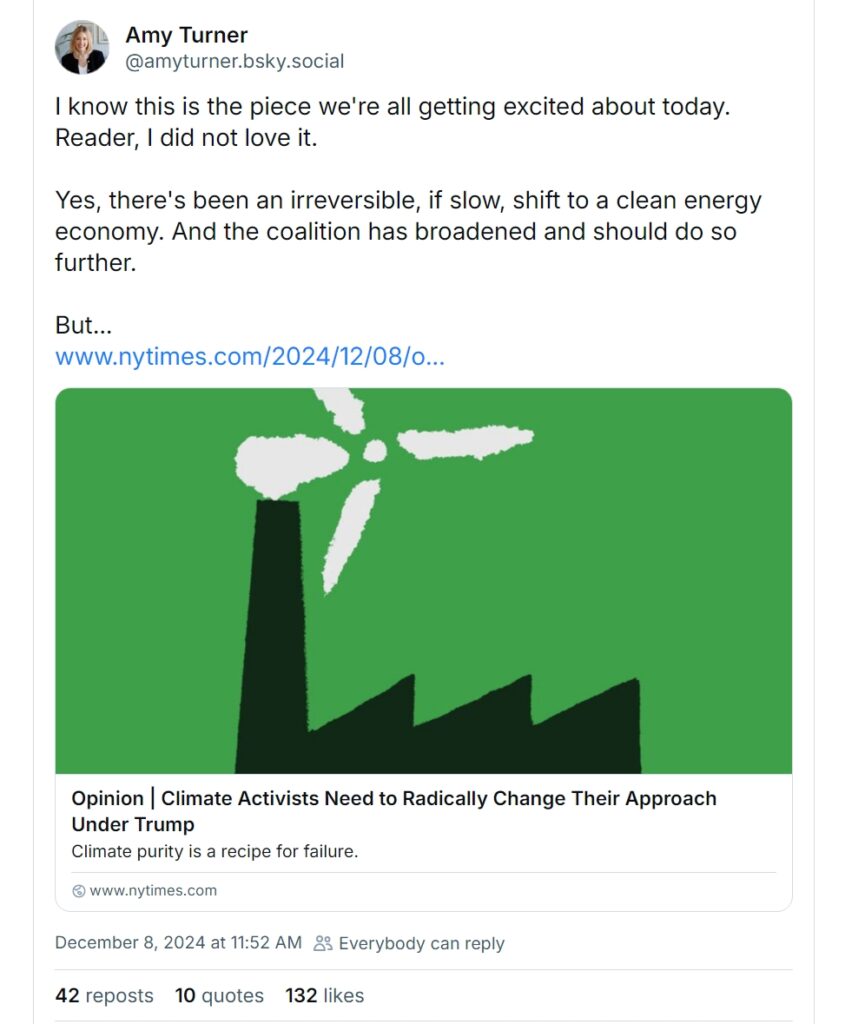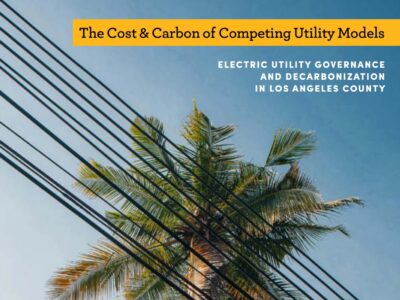How to Make Climate as Compelling as Egg Prices
While politicians are right to focus on cost of living, it’s dangerously wrong to assume voters rejected climate policies in the 2024 election.
How do we make the climate crisis as compelling to voters as the price of eggs? That’s a question—an existential question—I’ve been asking myself for weeks now. My UCLA Emmett Institute colleagues and I have some ideas that I’ll be sharing over the next weeks and months.
We’re hardly alone: Two months after a disheartening presidential election, some of the most effective climate messengers are grappling with how to talk about climate policy in new ways that broaden their appeal with more Americans. Advocacy groups, lawyers, researchers, scientists, and policymakers are all doing some version of this soul searching. Media organizations that cover climate politics are putting the spotlight on these discussions right now because the dust has settled from the election and the environmental consequences are among the most profound.
Some of the ideas springing from recent stories, blog posts and Op Eds are inspiring; some are depressing. Others are overly simplistic, and divisive. Many highlight the complex tension that my colleague Jim Salzman termed “The Greens’ Dilemma” and rehash the debate between ‘all-of-the-above’ energy versus timely phaseout. The truth is newspaper opinion pages can be lousy venues for this soul searching because editorial pages demand a definitive, fresh take in 1,000 words or less that is bound to boil down to a “this, not that” headline.

So, why eggs? Most weekends I carpool to the grocery store with my septuagenarian neighbor who lives on a fixed budget and all year he has obsessed over the price of a dozen eggs. He didn’t vote for Trump because of it, but inflation has dominated his thinking about the direction of the country like so many Americans. We’ve talked on our rides about how it’s largely because of avian flu constricting supply while there’s big consumer demand, but to him eggs remain an indicator that the economy is, well, rotten.
Egg prices are up more than 37% in the last year. Trump pointed to eggs in a recent NBC interview: “The groceries, when you buy apples, bacon, eggs — they were double and triple the price over a short period of time and I won an election based on that.” By far the most damaging political ad of the 2024 campaign was the one featuring Kamala Harris declaring, “Bidenomics is working.” Strategists for both the Harris and Trump campaigns agreed on that during a recent post-election panel. Polls and focus groups support this. A whopping 96% of voters said high prices for groceries and other goods were a factor in how they voted, according to AP VoteCast.
Which is why so many democrats from Washington to Sacramento—including leaders on climate policy—are taking one big lesson from the 2024 election: people want lower prices above all else. For instance, Sen. Sheldon Whitehouse (an expert communicator and soon the top democrat on the Environment and Public Works Committee) wants to talk less about industrial policy and more about how climate impacts are adding to people’s grocery bills and insurance premiums.
This is a moment to not learn the wrong lessons. So, let’s be clear that no presidential election has ever been lost on climate policy — and that includes 2024. The problem was that voters—especially swing voters in key states—weren’t motivated enough by it one way or the other. (In Pennsylvania where Harris lost by 1.7 percentage points, she famously changed positions on a fracking ban and spoke favorably about it during the one presidential debate about fossil fuel in that gas-heavy state.) In the end, just 7% of voters named “climate change” as the country’s #1 issue, according to some exit polls. Nearly 40% said the economy, choosing from among 9 issues.
This is a moment to not let Trumpworld define the election as a referendum on climate, which they’re absolutely trying to do. “If you make energy cheaper, everything becomes cheaper,” Trump advisor Jason Miller said in a (way too soft and un-fact checked) NPR interview this week. “When Biden came in, the first thing he did was start cutting off a lot of the energy exploration and repealing permits and things of that nature for where people were able to drill in the U.S. That caused energy to become more expensive,” Miller said. Restrictions on oil drilling are, of course, not exactly rampant and not the reason for high food prices. Challenge this narrative now.
Americans do worry about climate change even if they don’t vote on it much. At least 70% of Americans acknowledge the climate crisis and 62% say they feel a sense of responsibility to help reduce global warming, recent surveys show. Meanwhile only half of those polled say they hear stories about climate change in news headlines once a month or more frequently. And yet clean energy and affordability did appear in swing state ads for president, senate, and some local races. “It was actually seen as an asset in this campaign — not a central asset, but it was an asset,” Adrian Deveny, the former energy director for Senate Majority Leader Charles Schumer, said recently. “What we have identified is a formula for success, electoral success and policy design success going forward. And that that is a model to build off of.”
So, what would put the climate crisis more front and center? How do we make climate as compelling to voters as the price of eggs?
For at least a major percentage of the electorate, make it personal. Make it about saving money in the short and long term on things your family needs. Make it about a rigged system. Make it about sticking it to the corporations and corrupt politicians who want to keep you paying more for something you don’t actually want. I’m with Bill McKibben who writes that “We need to understand the darker sides of the American brain as well as the lighter ones, and we need to play to them.”
People know how much money they spend on eggs because it’s easy to track in the grocery aisle and in the news. Well, climate change is already impacting many of America’s favorite foods: chocolate, rice, potatoes, coffee, orange juice and more. In 2024, cocoa prices globally hit a record high due to extreme drought. What if we were reminded regularly that the cost of a chocolate milkshake and fries is going up because of climate change? Explain to people that their Grand Slam breakfast with a glass of OJ is more expensive because of extreme drought and I think more people will take notice. Find a way to tell them simply that deregulating the energy system is only good for billionaires and bad for your breakfast.

To reach more voters, why not call this earthflation and release a monthly report? Call it a Climate Price Index that once a month tallies several key indicators, including the price tag of recent extreme weather disasters, the added cost to key foods and products, the impact to insurance premiums, the monthly surface air and sea temperature highlights—like what the Copernicus Climate Change Service releases monthly. This regular report could function like the Bureau of Labor Statistics’ monthly Consumer Price Index that drives economic news headlines. News organizations would have a standardized report to plan routine coverage around. Broadcast news could include these data points in short, daily weather reports.
I confess this is a slightly gimmicky answer and that the question is overly simplistic. The “climate movement” is shorthand for a lot of different people. There are different messengers (NGOs, researchers, activists, local officials, national politicians, climate reporters) and there are myriad audiences (likely voters, swing state voters, Trump voters, hesitant policymakers, young people, new voters and nonvoters). No single approach will appeal to all these audiences. Winning climate messages will acknowledge that, yes, the rent is too damn high but solar, wind, and electric cars can make life cheaper if done right. In forthcoming Legal Planet posts, I’ll look at emerging strategies for how to talk about EVs, China, and Big Oil. I want to come to some conclusions about what those selling the Inflation Reduction Act got wrong and right; the role for storytelling in broadening coalitions; and whether it matters what words we use to describe the climate crisis—or earthflation .
At the California Legislature, leaders in both the Assembly and the Senate are focused on cost of living too. “California has always led the way on climate. And we will continue to lead on climate,” Assembly Speaker Robert Rivas said in recent remarks. “But not on the backs of poor and working people, not with taxes or fees for programs that don’t work, and not by blocking housing and critical infrastructure projects.” California will be especially important over the next four years as states and big cities lead the way; how legislative leaders here are framing the issues of climate and affordability will matter nationwide. “Policies that equitably address climate change can save Californians money in both the short and long term,” my colleague Julia Stein writes. “Legislators should spend the next session helping constituents realize—and understand—those benefits.”
While politicians are right to focus on cost of living, it would be dangerously wrong to leap to a broad assumption that voters somehow rejected Biden’s big climate law and any other policies to address climate change, strong environmental regulations, or even the administrative state. There’s a lot of questions about the way forward but one thing we can say for certain is that Trump’s victory was not a referendum on climate policy.
Reader Comments
One Reply to “How to Make Climate as Compelling as Egg Prices”
Comments are closed.






Good article, but the power of the right-wing and its media is vastly underestimated, including its effect on NPR and other liberal-ish media. “If you make energy cheaper, everything becomes cheaper,” Trump advisor Jason Miller said in a (way too soft and un-fact checked) NPR interview this week. This is typical of NPR, the heavy-weight in national public media.
In public media, including KQED here in SF where we think we get better media, the refusal to push back when allowing “both sides” to be heard, when clearly propagandistic or PR positions are voiced by the right, there is no push-back and no hard questioning. So the PR developed to obscure issues such as climate change is spread everywhere – even into the public media population which is more highly educated, statistically, than the norm.
The caving of ABC by settling Trump’s defamation suit against the network (“for $15 million, along with another $1 million in legal fees, a huge sum and one that appears to have emboldened the incoming president”) is a craven, cowardly act demanded by the right wing and its media. When NPR soft pedals it with the right, they are buying directly into this dynamic, and certainly “emboldening” the right. As NYT reports, Trump is going to after every news outlet that reported his lies, and the industry, instead of banding together, is caving.
Your article states, “The problem was that voters—especially swing voters in key states—weren’t motivated enough by it (climate crisis) one way or the other…” I beg to differ. The problem was that voters heard nothing about climate change on Fox News, and nothing to combat that on public media. Excepting, perhaps, KPFA in Berkeley. In fact the liberal-ish media followed the Fox model, and like lemmings, droned on and on about the price of eggs and inflation for months, creating a steady corrosion of Biden’s mostly positive economic policies. This article says it well: “At least 70% of Americans acknowledge the climate crisis and 62% say they feel a sense of responsibility to help reduce global warming, recent surveys show. Meanwhile only half of those polled say they hear stories about climate change in news headlines once a month or more frequently.” This lack of coverage is not an accident.
And when politicians do make statements about climate change, such as “California has always led the way on climate. And we will continue to lead on climate,” Assembly Speaker Robert Rivas said in recent remarks. ‘But not on the backs of poor and working people, not with taxes or fees for programs that don’t work, and not by blocking housing and critical infrastructure projects,’” this is code for dismantling CEQA, building on formerly irradiated sites, such as Treasure Island and toxic sites such as the Zeneca/Stauffer super fund site in Richmond. These statements are publicly stated permission for the developer and real estate industries to have their way with our environment. Poor and working people do not need housing that is built on toxic sites no matter how inexpensive it is. Poor and working people do not need housing built on toxic sites.
One plan for the Zeneca/Stauffer site was to not allow children and old people to live on the ground floor because they are particularly vulnerable, but to allow everyone else to be exposed to the toxicity.
The drive to appeal to the public about climate change is necessary and worth all of our efforts, but combatting the right’s media machine and those like NPR and ABC that are caving to it, must be a large part of that drive.